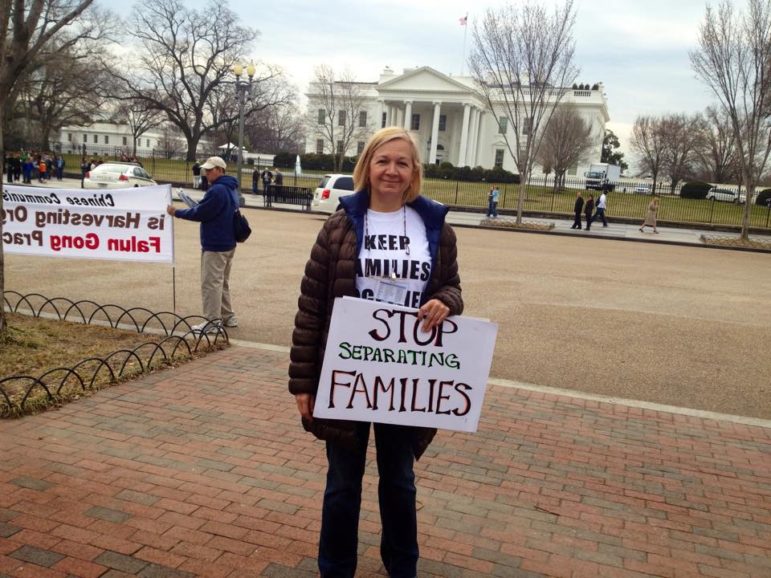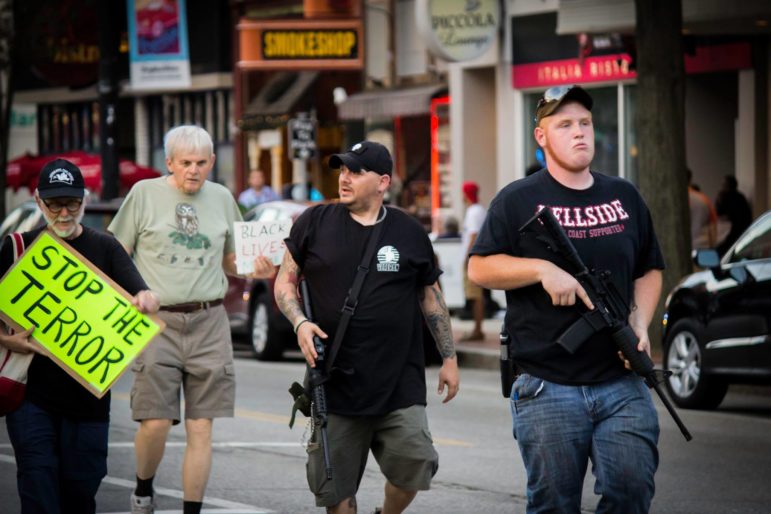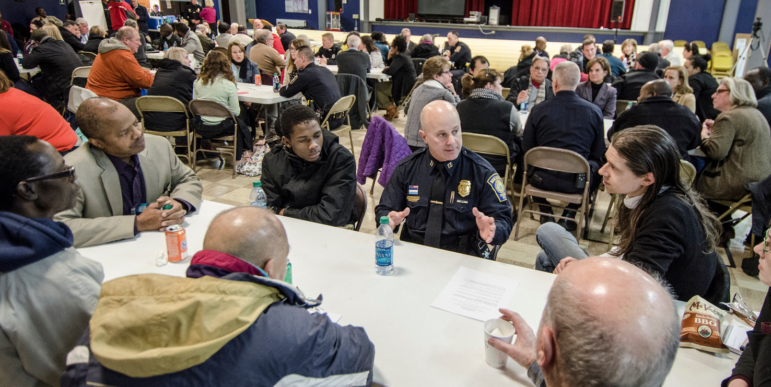
MANCHESTER, NH – Eva Castillo understands what frustration can do to a person.
She came to this country from Venezuela in the 1970s, and has had run-ins with immigration officers that even led to her own temporary deportation. She’s no stranger to picket lines and demonstrations. Because of her own journey, her passion is as a defender of rights for immigrants.
And because of those first-person experiences with injustice and persecution, Castillo understands the message Black Lives Matters protestors are trying to send by holding a third rally in Manchester, on July 23.
She just doesn’t agree with their methods.
“I do understand it. I’m frustrated – people of color are frustrated – yes, Latinos, too. But we don’t have the issue of racism here with our police department like we’re seeing in other places. Believe me, if I had seen evidence of that, I’d be the first one there with a sign,” says Castillo, a community activist who also serves as a Manchester Police Department commissioner.
“As much as I love a rally – and you should see my garage, it’s full of signs – I don’t believe this rally represents who we are as a community,” she says.
“While I understand the principle of Black Lives Matters, I see that this is not a unified group. There’s no structure – it’s something like the Occupy movement. I don’t know who’s leading, or what it represents. Nobody has come forward and said ‘We stand for this and this and this, and these are the people running the show’,” Castillo says.
When word on the street came that a group of counter protestors with rifles would be coming to Veterans Park last weekend, that was enough for her to keep her distance.

“In my mind I have to ask what’s the need for that? I don’t feel we have the racial issues in Manchester, so why create it by saying there is? Why do something that divides us, rather than come together as a community?” Castillo says.
Castillo didn’t always see both sides. When she first came to Manchester in 1984, she found herself becoming involved with the police department, but from the other side, as an advocate for undocumented residents who felt they were being targeted.
“I had no relationship with the police at all, back then. I couldn’t tell you the name of the Chief,” says Castillo. All that changed when David Mara became chief in 2008.
“We were having issues and protesting, and Chief Mara called us and invited us in to come in and talk. After that, he started the Community Advisory Board, and that’s when I began to learn that every story has two sides, and we interpret the story according to which side we’re seeing it from,” Castillo said.
High profile shootings around the country by police officers, particularly of black men, have now been compounded by high profile shootings of police officers. All of it tragic and unspeakable, says Castillo.
The weight of it all hit her last week like a brick, as she attended another swearing in ceremony for new officers at the MPAL center. Among the new recruits were two young men, around the same age as her own son, who also aspires to be a police officer.
“I’ve been to many of these ceremonies. This time, I cried because I started thinking about how these young officers could be my own 22-year-old son. It made me think in a different way. As I looked at the mothers and fathers watching their sons, it put me in their frame of mind. Who would want their child to be a police officer now?” Castillo says.
“We have a police department that is good, and we have to take this as an opportunity to show that Manchester is not the rest of the country, and that we’re really a good community to live in,” she says.
As proof, she points to Manchester’s recognition nationally for strides in reducing Disproportionate Minority Contact – or DMC – which is reviewed annually by the New Hampshire Center for Public Policy Studies. DMC is the measure of racial disparity among those caught up in the juvenile justice system, and refers to the “disproportion” of racial and ethnic minorities at all points within the system – from arrest to referrals, adjudication, diversion, detention, confinement, and into the adult court and adult corrections systems.
According to a 2013 report, the rate of arrests of African-American youth was more than three-times higher than that for white non-Hispanic youth. However, former Manchester Police Chief David Mara, who co-chaired the state’s DMC Advisory Group on Juvenile Justice, set the bar high for Manchester Police Officers, and that tradition remains intact under new Chief Willard, says Castillo.
If she could have a word with the organizers of the Black Lives Matter protest she would tell them she understands their frustration, but it doesn’t reflect the reality of what’s happening in her city.
“How is marching down the street and creating havoc, how is that going to advance the cause of racial and police relationships? Instead we should be coming together and talking, and building relationships. We already had two rallies. The more we do it, the more heated it seems people on either side become, and it takes only one loose cannon to destroy the efforts here to build community,” Castillo says.
“Does racism exist in some officers? Yes. That’s human nature. But at least from my perspective in Manchester, we don’t have a department that is racist; we have one that has kept doors open. We have the Chief’s ear – and that goes for everybody – you don’t have to be anyone special. You can bring your concerns to their attention any time,” Castillo says.
“Officers are human beings. They make mistakes. They’re afraid, and rightly so – both sides have been victimized from all this messaging on both sides. I would hate to be a police officer right now,” Castillo says. “We have to learn to see them as human beings. I only learned that when I put myself in their shoes, and asked them questions about why the did things a certain way. I came to see that what I perceived from the outside was totally wrong.”

Rather than marching in the streets, Castillo says she’s like to see a dialogue take place, between the community members and police officers.
“What we need is dialogue, to understand one another. Officers need to understand the fear coming from the community. I think we’re in a lucky position, that we already have a police department open to dialogues, so why not build on that?” she says.
She’d like to see something that looks like a citizens task force with members who represent all facets of the city.
“Just average citizens who feel disenfranchised from the processes, maybe through the Granite State Organizing Project – relationships and trust are not built overnight. This has to be a deliberate effort,” says Castillo. “Unfortunately, the ones who need to be involved aren’t the ones who come out to rallies.”
“In the 30 years I’ve lived here, I’ve changed, and so has my relationship with police. I didn’t trust them for anything. It’s happened gradually, but I’ve come to understand who they are and the job they have to do, from the inside out by building relatoinships and getting involved,” Castillo says.
“That’s what made me understand and trust what they do. It’s not perfect. There have been a couple times that I felt certain officers have been a little crispy with me, and so I mention it to them. But I have never seen an incident of force, or undue force,” says Castillo. “And if I did, you can bet I’d be the first one to stand outside Manchester Police Department with a sign.”







